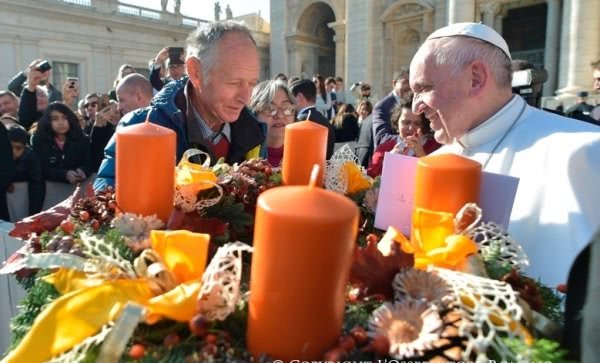Dear brothers and sisters, good morning!
Continuing with the catechesis on the Mass, we can wonder: what is the Mass, essentially? The Mass is the memorial of the paschal Mystery of Christ. It makes us participants in His victory over sin and death, and gives full meaning to our life.
Therefore, to understand the value of the Mass we must first and foremost understand the biblical meaning of “memorial.” It is “not merely the recollection of past events but … they become in a certain way present and real. This is how Israel understands its liberation from Egypt: every time Passover is celebrated, the Exodus events are made present to the memory of believers so that they may conform their lives to them” (Catechism of the Catholic Church, 1363). Jesus Christ, with His passion, death, resurrection and ascension to heaven, brought the Passover to fulfilment. And the Mass is the memorial of His Passover, of His “exodus”, that He fulfilled for us, to bring us out of slavery and to introduce to the promised land of eternal life. It is not merely a memory, no, it is more: it is making present what happened twenty centuries ago.
The Eucharist always leads us to the peak of the action of God’s salvation: the Lord Jesus, making Himself bread broken for us, pours onto us all His mercy and His love, as He did on the cross, so as to renew our heart, our existence and our way of relating to Him and with our brothers. As Vatican Council II says: “As often as the sacrifice of the cross by which ‘Christ our Pasch is sacrificed’ is celebrated on the altar, the work of our redemption is carried out” (Dogmatic Constitution Lumen gentium, 3).
Every celebration of the Eucharist is a ray of the sun that never sets, that is the risen Jesus. Participating in Mass, especially on Sunday, means entering into the victory of the Risen Christ, being illuminated by His light, heated by His warmth. Through the Eucharistic Celebration the Holy Spirit makes us participants in the divine life that is capable of transfiguring all our mortal being. And in His passage from death to life, from time to eternity, the Lord Jesus draws us too with Him to pass over. In Mass we pass over. We, in the Mass, are with Jesus, dead and risen again, and He pulls us ahead, towards eternal life. In Mass we join with Him. Rather, Christ lives in us and we live in Him, as Saint Paul affirms: “I have been crucified with Christ. It is no longer I who live, but Christ Who lives in me. And the life I now live in the flesh I live by faith in the Son of God, Who loved me and gave Himself for me” (Gal 2: 20). This is what Paul thought.
Indeed, His blood frees us from death and from the fear of death. It frees us not only from the dominion of physical death, but also from the spiritual death that is evil, sin, that takes over us every time we fall victim to our sin or that of others. And so our life is tarnished, loses its beauty, loses meaning, fades.
Christ, instead, gives life back to us; Christ is the fullness of life, and when He faced death He annihilated it for ever: “By rising from the dead, He destroyed death and restored life” (Eucharistic Prayer IV). The Passover of Christ is the definitive victory over death, because He transformed His death into the supreme act of love. He died for love! And in the Eucharist, He wishes to communicate to us this, His Paschal and victorious love. If we receive it with faith, we too can truly love God and our neighbour, we can love like He loved us, giving life.
If Christ’s love is in me, I can give myself fully to the other, in the inner certainty that even if the other should harm me I would not die; otherwise I would have to defend myself. The martyrs gave their life precisely because of this certainty of the victory of Christ over death. Only if we experience this power of Christ, the power of His love, are we truly free to give ourselves without fear. This is the Mass: entering into this passion, death, resurrection and ascension of Jesus; when we go to Mass it is as if we were to go to Calvary, the same. But think: if we at the moment of Mass go to Calvary – let us think, using our imagination – we know that the man there is Jesus. But, do we permit ourselves to chatter, to take photographs, to treat it a little like a show? No! Because there is Jesus! We would certainly stay in silence, in tears and in the joy of being saved. When we enter in Church to celebrate Mass, let us think this: I enter Calvary, where Jesus gave His life for me. And in this way the spectacle disappears, the chatter disappears, the comments and these things which distance us from that beautiful thing that is the Mass, the triumph of Jesus.
I think that now it is clearer how the Passover is present and active every time we celebrate Mass, that is, the sense of memorial. Participation in the Eucharist makes us enter into the Paschal Mystery of Christ, allowing us to pass over with Him from death to life; that is, there on Calvary. The Mass means repeating Calvary, it is not a spectacle.
